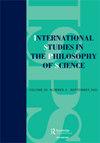规则与规范性问题
IF 0.8
2区 哲学
Q2 HISTORY & PHILOSOPHY OF SCIENCE
International Studies in the Philosophy of Science
Pub Date : 2022-04-03
DOI:10.1080/02698595.2022.2149050
引用次数: 0
摘要
调控的概念渗透在生物学中,例如在遗传调控网络和内分泌系统的模型中。调节有一个规范性的反面,即失调,它在疾病的生物医学模型中占有突出地位。然而,生物学中规范概念的使用被认为对物理主义的世界观提出了一些挑战,并提出了各种解决方案。到目前为止,生物学规范性问题主要与生物信息的概念有关。在本文中,我们将重点转移到生物调控的概念上,提出它为解决这些问题提供了一种有前景的新方法。调节系统的模型有几个特点:它们是因果的,但不涉及物理和化学所涵盖的能量交换和转换;此外,完全相连的调节系统可能会崩溃,这是因为它们及其因果调节特性依赖于脆弱的分子结构。生物调控系统表现出规范性,因为它们不是由物理和化学定律决定的,但它们与物理定律和物理主义本体论的密切关系是透明的。本文章由计算机程序翻译,如有差异,请以英文原文为准。
Regulation and the Normativity Problem
ABSTRACT The concept of regulation pervades biology, for example in models of genetic regulatory networks and the endocrine system. Regulation has a normative opposite, dysregulation, which figures prominently in biomedical models of disease. The use of normative concepts in biology, however, has been thought to present some challenges for the physicalist view of the world, and various resolutions have been proposed. Up to now the problem of biological normativity has been debated largely in connection with the concept of biological information. In this paper we shift focus to the concept of biological regulation, proposing that it provides a promising new approach to these issues. Models of regulatory systems have several features: they are causal, but they do not deal with the energy exchanges and transformations covered by physics and chemistry; further, and entirely connected, regulatory systems can break down, and this is because they and their causal-regulatory properties are dependent on fragile molecular structures. Biological regulatory systems exhibit normativity, because they are not determined by physical and chemical laws, but their close relationship with physical laws and physicalist ontology is transparent.
求助全文
通过发布文献求助,成功后即可免费获取论文全文。
去求助
来源期刊

International Studies in the Philosophy of Science
HISTORY & PHILOSOPHY OF SCIENCE-
自引率
12.50%
发文量
10
期刊介绍:
International Studies in the Philosophy of Science is a scholarly journal dedicated to publishing original research in philosophy of science and in philosophically informed history and sociology of science. Its scope includes the foundations and methodology of the natural, social, and human sciences, philosophical implications of particular scientific theories, and broader philosophical reflection on science. The editors invite contributions not only from philosophers, historians, and sociologists of science, but also from researchers in the sciences. The journal publishes articles from a wide variety of countries and philosophical traditions.
 求助内容:
求助内容: 应助结果提醒方式:
应助结果提醒方式:


